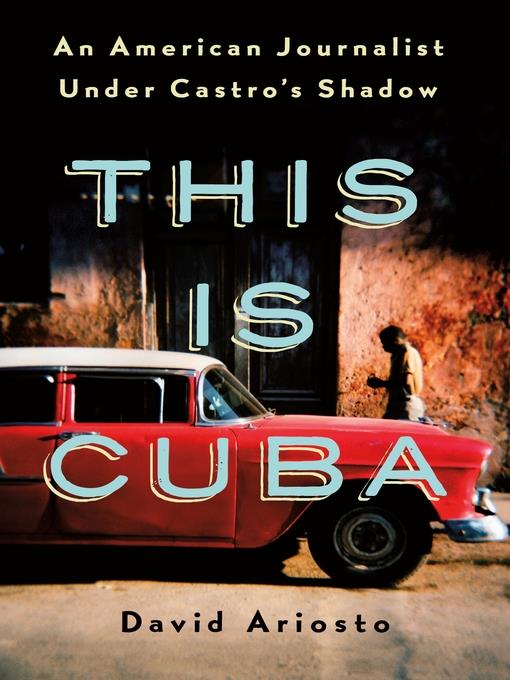
This Is Cuba
An American Journalist Under Castro's Shadow
کتاب های مرتبط
- اطلاعات
- نقد و بررسی
- دیدگاه کاربران
نقد و بررسی

October 1, 2018
A journalist witnesses social and political changes in post-Castro Cuba.Sent to Cuba in 2009 as a CNN cameraman and correspondent, Ariosto arrived in Havana naïve about Cuban culture, politics, and history. What he learned during his two-year stint for CNN, and from many subsequent trips, opened his eyes to the reality and prospects of the island nation. Like BBC correspondent Sarah Rainsford, whose recent memoir painted a dark portrait of Cuban life, Ariosto offers a penetrating report of a nation struggling with serious challenges. "In Cuba, everything is corrupt," one young man told the author, explaining his reasons for wanting to emigrate to America. "They sell an image of a certain life to the world. But it's a lie. There's cocaine. There's prostitution. There's corruption." With monthly wages at about $25, Ariosto estimates that about 95 percent of the country participates in a "shadow economy," where "theft is a relative concept" and procuring supplies or repairs depends on knowing "a guy who knew a guy." The author himself stocked up on necessities such as batteries and toilet paper during a brief trip home. Social problems abound: Despite Fidel Castro's aim for economic equality, racial discrimination has led to growing impoverishment among Cuba's black population. News is censored and information strictly controlled: Even as late as 2016, only 37 percent of Cubans could get online, and an hour of Wi-Fi service costs about a third of a month's salary, spawning "a patchwork of smuggled-in satellite dishes, a ramshackle network of homegrown, file-sharing entrepreneurs," and a thriving underground market. That spiderwebbed network, though, was hardly clandestine. In Havana, "eyes were everywhere": closed-circuit cameras, onlookers and informants in the streets, and government employees at CNN who were expected to submit reports about the journalists. Although Barack Obama's efforts to forge ties to Cuba inspired a "kumbaya moment," Donald Trump's policies are dashing hopes, and housing, food, and medicine shortages create a crisis of confidence among a restive population.A candid firsthand account of an island undergoing a shaky transition.
COPYRIGHT(2018) Kirkus Reviews, ALL RIGHTS RESERVED.

November 15, 2018
For a self-described "young American photojournalist who then boasted only pidgin Spanish," Ariosto's arrival in Havana in 2009 on assignment for CNN was "the chance of a lifetime." Determined to be "somehow different from those pink-faced tourists," he's quickly reduced to an epithet, yuma?street slang for "gringo." A year and a half later, he's "ready to leave-forever, [he] thought," disenchanted with food shortages (shopping is an all-day ordeal), housing (a sink used in the morning disappears by afternoon), and being watched ("trust was at a premium"). He quickly "come[s] to loathe" the catchall nonsensical phrase used to explain "the unexplainable": "This is Cuba." Beyond professional opportunities?interviewing dissident blogger Yo�ni Sanchez, following Cuban doctors through Haiti's 2010 earthquake aftermath, covering political-prisoner releases?negotiating daily life overshadows his "fantasies." Departing, however, doesn't sever island ties; unprecedented historical events, including presidential shifts in both Cuba and the U.S., engender return trips. Despite repetition and disjointedness (some chapters seem like separate essays), Ariosto's insights are plentiful, and amid erratically evolving Cuba-U.S. relations, such personal perspectives, even from a yuma, provide the best portals to mutual understanding.(Reprinted with permission of Booklist, copyright 2018, American Library Association.)

Starred review from January 1, 2019
Photojournalist Ariosto spent 2009...10 on assignment in Havana, Cuba, and has regularly returned to the country ever since. His accounts are part memoir, part reflection of a broken country still under the sway of Cold War beliefs despite recent signs of economic and social recovery after the overtures of President Obama's efforts to restore U.S.-Cuba relations in 2014. Ariosto sees few differences between Cuban leaders Fidel and Ra�l Castro. Even with the return of American tourists and improved Wi-Fi, the transition to economic and cultural opportunity is still in flux and the Cuban future uncertain. A chapter on the black market, or shadow economy, holds little promise for the country's success. As one pensioner who fought under the Cuban flag in Angola states, "in Cuba you don't live but survive--on $13 a month." Ariosto's work is at times chilling, but with a touch of nostalgia and humor. VERDICT Cuba watchers should read this informative new work, as should all interested in a country that is geographically closer to the United States than some might realize.--Boyd Childress, formerly with Auburn Univ. Libs., AL
Copyright 1 Library Journal, LLC Used with permission.
Photojournalist Ariosto spent 2009...10 on assignment in Havana, Cuba, and has regularly returned to the country ever since. His accounts are part memoir, part reflection of a broken country still under the sway of Cold War beliefs despite recent signs of economic and social recovery after the overtures of President Obama's efforts to restore U.S.-Cuba relations in 2014. Ariosto sees few differences between Cuban leaders Fidel and Ra�l Castro. Even with the return of American tourists and improved Wi-Fi, the transition to economic and cultural opportunity is still in flux and the Cuban future uncertain. A chapter on the black market, or shadow economy, holds little promise for the country's success. As one pensioner who fought under the Cuban flag in Angola states, "in Cuba you don't live but survive--on $13 a month." Ariosto's work is at times chilling, but with a touch of nostalgia and humor. VERDICT Cuba watchers should read this informative new work, as should all interested in a country that is geographically closer to the United States than some might realize.--Boyd Childress, formerly with Auburn Univ. Libs., AL
Copyright 1 Library Journal, LLC Used with permission.
























دیدگاه کاربران